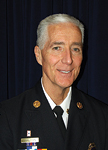
Often, we hear, “Why did they print that?” or “Why did someone allow someone to write something ‘we’ disagree with?” Nowadays, it is almost a crime to say or think something someone else finds offensive, even in some fire service organizations. This is tragic and is by very definition tyranny. We have all been places where it was said with righteous indignation that we should not allow folks who disagree with the science, the standards, the code, the opinion of this expert or that expert, or this training or that training to be heard or allowed to have a platform. We should, in fact, silence all who disagree with us.
In 1914, Walter Williams wrote “The Journalist’s Creed,” “a landmark document for the industry known as the ‘Fourth Estate.’” Walter was president of the University of Missouri from 1930 to 1935; the interesting thing about Walter was that he did not have a college degree. He was an old-school newspaper person. He started young and worked hard to become excellent at every aspect of the job. Walter worked hard to understand all he could about journalism and its obligation to society.
Walter Williams’ understanding of this relationship was expressed in the creed he wrote. It reflected his belief in fair and honest reporting, in the need for the independence of journalists from the undue influence of politics, money, or government. It was an expression of the ethics that he knew were necessary for the industry he loved. Walter gave to all those who would subsequently take up the call to write or report a creed, a code, and a way of being within journalism.
With all the electronic media, some folks think the time has come for a new code and a new creed. How firefighters and folks get information is changing; it is not good or bad—it is simply a change in how information is consumed and delivered. But serious journalists assert the fundamental question is, Have ethics changed, has morality changed, has the role of the journalist and the relationship with the consumer changed?
These are big questions, and we humbly are not the authority to help navigate these questions and ramifications of the possible answers, nor can I claim to qualify as a journalist. At best, I am a flaneur wandering uncertainly on the sidelines of the world’s most admired profession, firefighting. We believe, however, albeit with little in common with the great Walter Williams, that he was undeniably correct, that like the Magna Carta, the Rights of Man, the Declaration of Independence, and the United States Constitution, his words are timeless. His intention and contentions are as true and necessary today as the day he wrote them and will always be.
I believe in the profession of journalism.
I believe that the public journal is a public trust; that all connected with it are, to the full measure of their responsibility, trustees for the public; that acceptance of a lesser service than the public service is betrayal of this trust.
I believe that clear thinking and clear statement, accuracy and fairness are fundamental to good journalism.
I believe that a journalist should write only what he holds in his heart to be true.
I believe that suppression of the news, for any consideration other than the welfare of society, is indefensible.
I believe that no one should write as a journalist what he would not say as a gentleman; that bribery by one’s own pocketbook is as much to be avoided as bribery by the pocketbook of another; that individual responsibility may not be escaped by pleading another’s instructions or another’s dividends.
I believe that advertising, news and editorial columns should alike serve the best interests of readers; that a single standard of helpful truth and cleanness should prevail for all; that the supreme test of good journalism is the measure of its public service.
I believe that the journalism which succeeds best—and best deserves success—fears God and honors Man; is stoutly independent, unmoved by pride of opinion or greed of power, constructive, tolerant but never careless, self-controlled, patient, always respectful of its readers but always unafraid, is quickly indignant at injustice; is un-swayed by the appeal of privilege or the clamor of the mob; seeks to give every man a chance and, as far as law and honest wage and recognition of human brotherhood can make it so, an equal chance; is profoundly patriotic while sincerely promoting international good will and cementing world-comradeship; is a journalism of humanity, of and for today’s world.
George Orwell said, “If liberty means anything at all, it means the right to tell people what they do not want to hear.” John Stuart Mill likewise wrote that one of the worst offenses against freedom is “to stigmatize those who hold the contrary opinion as bad and immoral men.” The preservation of free speech and an unbiased press are as important to the fire service as our nation. As bureaucratic entrepreneurism finds ever more ways to profit and thrive within the fire service with the seemingly endless proliferation of codes and standards, processes, and procedures, some of which are now being sanctified by the clergy of the church of “science,” an open and unaffiliated platform is even more critical.
Only by keeping these pages open to every firefighter can we respect the inalienable humanity of our mission as sacred and primary in all we do. For any innovation or insight to occur, we must appreciate the pride of workmanship on which our industry has built its legacy. Firefighters struggle to gain mastery of our tasks not for more pay or promotion but for something much larger than ourselves. These pages will continue to allow the joy of local ownership, the justice of collaborative problem solving, and the power of diversity and local expertise to thrive and be heard, regardless of whose feelings are hurt.

